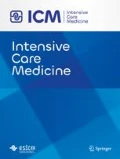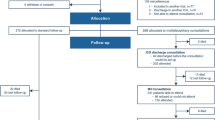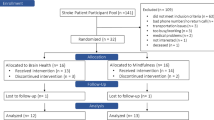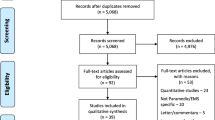Abstract
Purpose
Survivors of acute lung injury (ALI) and their informal caregivers have difficulty coping with the physical and emotional challenges of recovery from critical illness. We aimed to develop and pilot test a telephone-based coping skills training intervention for this population.
Methods
Fifty-eight participants were enrolled overall. A total of 21 patients and 23 caregivers participated in a cross-sectional study to assess coping and its association with psychological distress. This also informed the development of an ALI coping skills training intervention in an iterative process involving content and methodological experts. The intervention was then evaluated in seven patients and seven caregivers in an uncontrolled, prospective, pre-post study. Outcomes included acceptability, feasibility, and symptoms of psychological distress measured with the Hospital Anxiety and Depression Scale (HADS) and Post-Traumatic Symptom Scale (PTSS).
Results
Survivors and their caregivers used adaptive coping infrequently, a pattern that was strongly associated with psychological distress. These findings informed the development of a 12-session intervention for acquiring, applying, and maintaining coping skills. In the evaluation phase, participants completed 77 (92 %) of a possible 84 telephone sessions and all (100 %) reported the intervention’s usefulness in their daily routine. Mean change scores reflecting improvements in the HADS (7.8 U) and PTSS (10.3 U) were associated with adaptive coping (r = 0.50–0.70) and high self-efficacy (r = 0.67–0.79).
Conclusions
A novel telephone-based coping skills training intervention was acceptable, feasible, and may have been associated with a reduction in psychological distress among survivors of ALI and their informal caregivers. A randomized trial is needed to evaluate the intervention.


Similar content being viewed by others
References
Herridge MS, Tansey CM, Matte A, Tomlinson G, Diaz-Granados N, Cooper A, Guest CB, Mazer CD, Mehta S, Stewart TE, Kudlow P, Cook D, Slutsky AS, Cheung AM, Canadian Critical Care Trials Group (2011) Functional disability 5 years after acute respiratory distress syndrome. N Engl J Med 364:1293–1304
Rubenfeld GD, Caldwell E, Peabody E, Weaver J, Martin DP, Neff M, Stern EJ, Hudson LD (2005) Incidence and outcomes of acute lung injury. N Engl J Med 353:1685–1693
Cox CE, Docherty S, Brandon D, Whaley C, Attix D, Dore DV, Clay AS, Govert JA, Hough CL, White DB, Tulsky JA (2009) Surviving critical illness: the experience of acute respiratory distress syndrome patients and their caregivers. Crit Care Med 37:2702–2708
Davydow DS, Desai SV, Needham DM, Bienvenu OJ (2008) Psychiatric morbidity in survivors of the acute respiratory distress syndrome: a systematic review. Psychosom Med 70:512–519
Davydow DS, Gifford JM, Desai SV, Bienvenu OJ, Needham DM (2009) Depression in general intensive care unit survivors: a systematic review. Intensive Care Med 35:796–809
Kessler RC, Chiu WT, Demler O, Merikangas KR, Walters EE (2005) Prevalence, severity, and comorbidity of 12-month DSM-IV disorders in the National Comorbidity Survey Replication. Arch Gen Psychiatry 62:617–627
Schelling G, Stoll C, Haller M, Briegel J, Manert W, Hummel T, Lenhart A, Heyduck M, Polasek J, Meier M, Preuss U, Bullinger M, Schuffel W, Peter K (1998) Health-related quality of life and posttraumatic stress disorder in survivors of the acute respiratory distress syndrome. Crit Care Med 26:651–659
Azoulay E, Pochard F, Kentish-Barnes N, Chevret S, Aboab J, Adrie C, Annane D, Bleichner G, Bollaert PE, Darmon M, Fassier T, Galliot R, Garrouste-Orgeas M, Goulenok C, Goldgran-Toledano D, Hayon J, Jourdain M, Kaidomar M, Laplace C, Larche J, Liotier J, Papazian L, Poisson C, Reignier J, Saidi F, Schlemmer B (2005) Risk of post-traumatic stress symptoms in family members of intensive care unit patients. Am J Respir Crit Care Med 171:987–994
Pochard F, Azoulay E, Chevret S, Lemaire F, Hubert P, Canoui P, Grassin M, Zittoun R, le Gall JR, Dhainaut JF, Schlemmer B (2001) Symptoms of anxiety and depression in family members of intensive care unit patients: ethical hypothesis regarding decision making capacity. Crit Care Med 29:1893–1897
Covinsky KE, Goldman L, Cook EF, Oye R, Desbiens N, Reding D, Fulkerson W, Connors AF Jr, Lynn J, Phillips RS (1994) The impact of serious illness on patients’ families. JAMA 272:1839–1844
Snyder CR (1999) Coping: the psychology of what works. Oxford University Press, New York
Bandura A (1997) Self-efficacy: the exercise of control. Freeman, New York
Blumenthal JA, Babyak MA, Keefe FJ, Davis RD, Lacaille RA, Carney RM, Freedland KE, Trulock E, Palmer SM (2006) Telephone-based coping skills training for patients awaiting lung transplantation. J Consult Clin Psychol 74:535–544
Porter LS, Keefe FJ, Garst J, Baucom DH, Mc Bride CM, McKee DC, Sutton L, Carson K, Knowles V, Rumble M, Scipio C (2010) Caregiver-assisted coping skills training for lung cancer: results of a randomized clinical trial. J Pain Symptom Manage 41:1–13
Knaus WA, Draper EA, Wagner DP, Zimmerman JE (1985) APACHE II: a severity of disease classification system. Crit Care Med 13:818–829
Zigmond AS, Snaith RP (1983) The hospital anxiety and depression scale. Acta Psychiatr Scand 67:361–370
Bjelland I, Dahl AA, Haug TT, Neckelmann D (2002) The validity of the Hospital Anxiety and Depression Scale. An updated literature review. J Psychosom Res 52:69–77
Lowe B, Spitzer RL, Grafe K, Kroenke K, Quenter A, Zipfel S, Buchholz C, Witte S, Herzog W (2004) Comparative validity of three screening questionnaires for DSM-IV depressive disorders and physicians’ diagnoses. J Affect Disord 78:131–140
Stoll C, Kapfhammer HP, Rothenhausler HB, Haller M, Briegel J, Schmidt M, Krauseneck T, Durst K, Schelling G (1999) Sensitivity and specificity of a screening test to document traumatic experiences and to diagnose post-traumatic stress disorder in ARDS patients after intensive care treatment. Intensive Care Med 25:697–704
Carver CS (1997) You want to measure coping but your protocol’s too long: consider the brief COPE. Int J Behav Med 4:92–100
Lorig K, Chastain RL, Ung E, Shoor S, Holman HR (1989) Development and evaluation of a scale to measure perceived self-efficacy in people with arthritis. Arthritis Rheum 32:37–44
The EuroQol Group (1990) EuroQol—a new facility for the measurement of health-related quality of life health policy 16:199–208
Keefe FJ, Ahles TA, Porter LS, Sutton LM, McBride CM, Pope MS, McKinstry ET, Furstenberg CP, Dalton J, Baucom DH (2003) The self-efficacy of family caregivers for helping cancer patients manage pain at end-of-life. Pain 103:157–162
Porter LS, Keefe FJ, Garst J, McBride CM, Baucom D (2008) Self-efficacy for managing pain, symptoms, and function in patients with lung cancer and their informal caregivers: associations with symptoms and distress. Pain 137:306–315
Keefe FJ, Caldwell DS, Baucom D, Salley A, Robinson E, Timmons K, Beaupre P, Weisberg J, Helms M (1999) Spouse-assisted coping skills training in the management of knee pain in osteoarthritis: long-term followup results. Arthritis Care Res 12:101–111
Davydow DS (2010) The burden of adverse mental health outcomes in critical illness survivors. Crit Care 14:125
Herridge MS, Cheung AM, Tansey CM, Matte-Martyn A, Diaz-Granados N, Al-Saidi F, Cooper AB, Guest CB, Mazer CD, Mehta S, Stewart TE, Barr A, Cook D, Slutsky AS (2003) One-year outcomes in survivors of the acute respiratory distress syndrome. N Engl J Med 348:683–693
Hough CL, Curtis JR (2005) Long-term sequelae of critical illness: memories and health-related quality of life. Crit Care 9:145–146
Bernard GR, Artigas A, Brigham KL, Carlet J, Falke K, Hudson L, Lamy M, Legall JR, Morris A, Spragg R (1994) The American–European Consensus Conference on ARDS. Definitions, mechanisms, relevant outcomes, and clinical trial coordination. Am J Respir Crit Care Med 149:818–824
Cox CE, Porter LS, Hough CL, Kahn JM, Carson SS, Curtis JR, White DB, Keefe FJ (2011) Telephone-based coping skills training for acute lung injury survivors & their informal caregivers. Intensive Care Med 37(Suppl 1):S135
Baucom DH, Shoham V, Mueser KT, Daiuto AD, Stickle TR (1998) Empirically supported couple and family interventions for marital distress and adult mental health problems. J Consult Clin Psychol 66:53–88
Napolitano MA, Babyak MA, Palmer S, Tapson V, Davis RD, Blumenthal JA (2002) Effects of a telephone-based psychosocial intervention for patients awaiting lung transplantation. Chest 122:1176–1184
Jubran A, Lawm G, Duffner LA, Collins EG, Lanuza DM, Hoffman LA, Tobin MJ (2010) Post-traumatic stress disorder after weaning from prolonged mechanical ventilation. Intensive Care Med 36:2030–2037
Myhren H, Ekeberg O, Toien K, Karlsson S, Stokland O (2010) Posttraumatic stress, anxiety and depression symptoms in patients during the first year post intensive care unit discharge. Crit Care 14:R14
Sukantarat K, Greer S, Brett S, Williamson R (2007) Physical and psychological sequelae of critical illness. Br J Health Psychol 12:65–74
Twigg E, Humphris G, Jones C, Bramwell R, Griffiths RD (2008) Use of a screening questionnaire for post-traumatic stress disorder (PTSD) on a sample of UK ICU patients. Acta Anaesthesiol Scand 52:202–208
Phua J, Badia JR, Adhikari NK, Friedrich JO, Fowler RA, Singh JM, Scales DC, Stather DR, Li A, Jones A, Gattas DJ, Hallett D, Tomlinson G, Stewart TE, Ferguson ND (2009) Has mortality from acute respiratory distress syndrome decreased over time?: a systematic review. Am J Respir Crit Care Med 179:220–227
Chelluri L, Im KA, Belle SH, Schulz R, Rotondi AJ, Donahoe MP, Sirio CA, Mendelsohn AB, Pinsky MR (2004) Long-term mortality and quality of life after prolonged mechanical ventilation. Crit Care Med 32:61–69
Cox CE, Martinu T, Sathy SJ, Clay AS, Chia J, Gray AL, Olsen MK, Govert JA, Carson SS, Tulsky JA (2009) Expectations and outcomes of prolonged mechanical ventilation. Crit Care Med 37:2888–2894
Jones C, Skirrow P, Griffiths RD, Humphris G, Ingleby S, Eddleston J, Waldmann C, Gager M (2004) Post-traumatic stress disorder-related symptoms in relatives of patients following intensive care. Intensive Care Med 30:456–460
Wells KB, Miranda J (2007) Reducing the burden of depression: building villages for coordinated care. JAMA 298:1451–1452
Broadhead WE, Blazer DG, George LK, Tse CK (1990) Depression, disability days, and days lost from work in a prospective epidemiologic survey. JAMA 264:2524–2528
Kessler RC, Frank RG (1997) The impact of psychiatric disorders on work loss days. Psychol Med 27:861–873
Sharpe L, Allard S, Sensky T (2008) Five-year followup of a cognitive-behavioral intervention for patients with recently diagnosed rheumatoid arthritis: effects on health care utilization. Arthritis Rheum 59:311–316
Unutzer J, Patrick DL, Simon G, Grembowski D, Walker E, Rutter C, Katon W (1997) Depressive symptoms and the cost of health services in HMO patients aged 65 years and older. A 4-year prospective study. JAMA 277:1618–1623
Wang PS, Simon GE, Avorn J, Azocar F, Ludman EJ, McCulloch J, Petukhova MZ, Kessler RC (2007) Telephone screening, outreach, and care management for depressed workers and impact on clinical and work productivity outcomes: a randomized controlled trial. JAMA 298:1401–1411
Wunsch H, Angus DC, Harrison DA, Collange O, Fowler R, Hoste EA, de Keizer NF, Kersten A, Linde-Zwirble WT, Sandiumenge A, Rowan KM (2008) Variation in critical care services across North America and Western Europe. Crit Care Med 36(2787–2793):e2781–e2789
Jubran A, Lawm G, Kelly J, Duffner LA, Gungor G, Collins EG, Lanuza DM, Hoffman LA, Tobin MJ (2010) Depressive disorders during weaning from prolonged mechanical ventilation. Intensive Care Med 36:828–835
Kroenke K, Theobald D, Wu J, Norton K, Morrison G, Carpenter J, Tu W (2010) Effect of telecare management on pain and depression in patients with cancer: a randomized trial. JAMA 304:163–171
Acknowledgments
Salary support was provided by National Institutes of Health awards K23 HL081048 (C.E.C.), K23 AG032875 (D.B.W.), K23 HL082650 (J.M.K.), and K23 HL067068 (S.S.C.). The authors wish to thank Verena Knowles, RN for conducting the coping skills training telephone sessions and Brenda Walton, M.Div. for conducting interviews.
Author information
Authors and Affiliations
Corresponding author
Electronic supplementary material
Below is the link to the electronic supplementary material.
Rights and permissions
About this article
Cite this article
Cox, C.E., Porter, L.S., Hough, C.L. et al. Development and preliminary evaluation of a telephone-based coping skills training intervention for survivors of acute lung injury and their informal caregivers. Intensive Care Med 38, 1289–1297 (2012). https://doi.org/10.1007/s00134-012-2567-3
Received:
Accepted:
Published:
Issue Date:
DOI: https://doi.org/10.1007/s00134-012-2567-3




